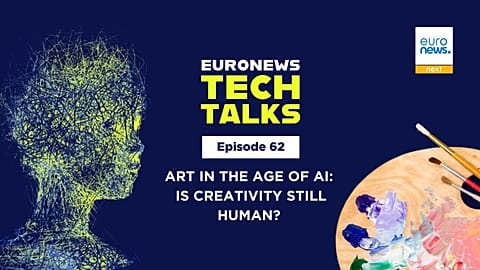Cryptocurrency has been talked about for years. You might even know someone who has invested in Bitcoin or one of the thousands of other ‘cryptos’ that exist. But has cryptocurrency and its blockchain technology fully landed in Europe?
Zug, a small Swiss canton nestled by a shimmering lake and framed by the Alps, is famous for its traditional cherry pie - which was particularly loved by actress Audrey Hepburn - and for its blockchain start-up hub.
 ADVERTISEMENT
ADVERTISEMENT
 ADVERTISEMENT
ADVERTISEMENT
There you may not be able to pay for your coffee in Bitcoin just yet, but you'll find yourself surrounded by folks working in crypto - who are actually able to pay their taxes in Bitcoin.
In this new episode of the Euronews Tech Talks podcast, we visit Zug, the heart of Europe's so-called "Crypto Valley", talk about trust in decentralised banking systems, and see how renewable energy sources are changing Bitcoin mining in Europe.
Cryptocurrency and blockchain companies have spread very quickly in the European area between Switzerland, Liechtenstein and northern Italy.
According to recent research by CV VC, a Zug-based venture capital firm, there are more than 1,100 blockchain-related entities thriving between Switzerland, Liechtenstein and northern Italy.
These companies employ nearly 6,000 people and are worth a combined $185 billion, as of December 2022. That's more than the GDP of countries like Kuwait or Morocco.
Yet blockchain, the technology that underpins it, remains widely misunderstood and distrusted by Europeans.
Over the next three episodes, the Euronews Tech Talks team will explore the world of blockchain from a European perspective to find answers to these questions: how is blockchain already impacting life in Europe? And will crypto ever become mainstream?
Bitcoin, the visible face of cryptocurrencies
Bitcoin, ether, tether, Dogecoin, Cardano. None of these terms existed before 2008, but over a decade later, cryptocurrencies and blockchain technology are radically disrupting the world of finance.
Bitcoin is the most recognisable among them. It was created in 2009 by Satoshi Nakamoto. The name is a pseudonym for the mysterious person or persons who developed it. Blockchain, the technology behind cryptocurrency, has its roots as far back as 1991, when two scientists Stewart Haber and Scott Tanita, proposed a system to protect timestamps on documents from being interfered with.
Unlike traditional currencies issued by central banks, Bitcoin is not controlled by any government or financial institution. It allows for peer-to-peer transactions without the need for intermediaries.
But blockchain technology goes beyond Bitcoin and crypto. In our next episode, we’ll feature a conversation between two experts who will tell us how it works with web3, smart contracts and NFTs.
Euronews Tech Talks Podcast: Unravelling Europe's Digital Landscape
In our previous episodes, we delved into the world of generative AI from a European perspective.
Do you want to know if software such as ChatGPT or Dall-e are already replacing the workforce in Europe or if we are facing a nuclear winter or a robotic paradise? You can listen to it here.























